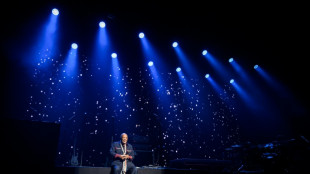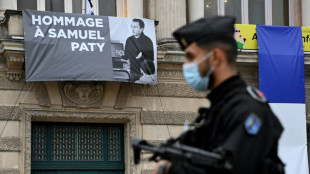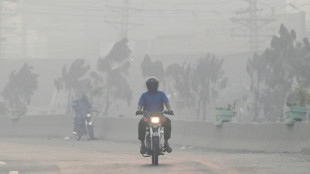
-
 US writes off over $1 billion of Somalia debt
US writes off over $1 billion of Somalia debt
-
Stock markets climb, dollar dips as US votes

-
 Boeing union approves contract, ending over 7-week strike
Boeing union approves contract, ending over 7-week strike
-
Stock markets rise, dollar falls as US votes

-
 US September trade deficit widest in over two years
US September trade deficit widest in over two years
-
'Black day': French workers protest Michelin plans to close two plants

-
 Saudi Aramco's quarterly profit drops 15% on low oil prices
Saudi Aramco's quarterly profit drops 15% on low oil prices
-
Spain unveils aid plan a week after catastrophic floods

-
 Europe auto struggles lead to cuts at Michelin, Germany's Schaeffler
Europe auto struggles lead to cuts at Michelin, Germany's Schaeffler
-
Norway speeds ahead of EU in race for fossil-free roads

-
 Most Asian markets rise as US heads to polls in toss-up vote
Most Asian markets rise as US heads to polls in toss-up vote
-
Nintendo lowers sales forecast as first-half profits plunge

-
 Most Asian markets rise ahead of toss-up US election
Most Asian markets rise ahead of toss-up US election
-
Saudi Aramco says quarterly profit drops 15% on low oil prices

-
 Boeing union says approves contract, ending over 7-week strike
Boeing union says approves contract, ending over 7-week strike
-
New Hampshire hamlet tied in first US Election day votes

-
 China's premier 'fully confident' of hitting growth targets
China's premier 'fully confident' of hitting growth targets
-
Asian markets swing ahead of toss-up US election

-
 Turkey sacks 3 mayors on 'terror' charges, sparking fury in southeast
Turkey sacks 3 mayors on 'terror' charges, sparking fury in southeast
-
Prince William plays rugby on S.Africa climate prize visit

-
 Striking workers weigh latest Boeing contract offer
Striking workers weigh latest Boeing contract offer
-
Montreux Jazz Festival hails 'godfather' Quincy Jones

-
 Stock markets hesitant before knife-edge US election
Stock markets hesitant before knife-edge US election
-
'War ruined me': Lebanon's farmers mourn lost season

-
 Stock markets rise before knife-edge US election
Stock markets rise before knife-edge US election
-
Eight on trial over French teacher's 2020 beheading

-
 Ryanair profit falls, growth hit by Boeing delays
Ryanair profit falls, growth hit by Boeing delays
-
Quincy Jones, entertainment titan and music mastermind

-
 Most markets rise ahead of US vote, China stimulus meeting
Most markets rise ahead of US vote, China stimulus meeting
-
Most Asian markets rise ahead of US vote, China stimulus meeting

-
 Climate finance billions at stake at COP29
Climate finance billions at stake at COP29
-
Nations gather for crunch climate talks in shadow of US vote

-
 Asian markets rise ahead of US election, Chinese stimulus meeting
Asian markets rise ahead of US election, Chinese stimulus meeting
-
No need to tell your husband: Harris banks on women's votes

-
 Striking Boeing workers set to vote on latest offer
Striking Boeing workers set to vote on latest offer
-
Pakistan shuts primary schools in Lahore over record pollution

-
 Fading literature: Delhi's famed Urdu Bazaar on last legs
Fading literature: Delhi's famed Urdu Bazaar on last legs
-
Green shoots spring from ashes in Brazil's fire-resistant savanna

-
 Serbia to demolish 'German' bridge amid outcry
Serbia to demolish 'German' bridge amid outcry
-
War decimates harvest in famine-threatened Sudan

-
 Nuts! NY authorities euthanize Instagram squirrel star
Nuts! NY authorities euthanize Instagram squirrel star
-
Nvidia to join Dow Jones Industrial Average, replacing Intel

-
 US stocks rebound on Amazon results ahead of Fed, election finale
US stocks rebound on Amazon results ahead of Fed, election finale
-
Wall Street bounces while oil prices climb on Middle East worries

-
 For a blind runner, the New York marathon is about 'vibrations'
For a blind runner, the New York marathon is about 'vibrations'
-
Wall Street bounces while oil prices gain on geopolitical fears

-
 ExxonMobil profits dip as it gives back almost $10 bn to investors
ExxonMobil profits dip as it gives back almost $10 bn to investors
-
Global stocks diverge, oil prices gain on geopolitical fears

-
 On Belgian coast, fishing on horseback -- and saving a tradition
On Belgian coast, fishing on horseback -- and saving a tradition
-
French brushmakers stage 'comeback' with pivot to luxury market


Ukrainian journalists carve out new niche in Germany
Two months ago, Roksana Panashchuk was working as a freelance journalist in Ukraine. Now, she's a refugee in Germany, closely watching events back home from the northeastern city of Greifswald.
"The situation is tough, of course, but everyone is doing what they can," she told AFP.
"Soldiers are fighting, volunteers are distributing food and ammunition" -- and journalists are "telling the truth... about what's going on" in Ukraine.
Panashchuk is working as a coordinator for a network of Ukrainian journalists at home and abroad funded and organised by the German magazine Katapult, which specialises in statistics and social scientific studies.
The project is one of many such initiatives that have sprung up in Germany since Russia invaded Ukraine on February 24.
The RTL network has launched a daily TV show hosted by Ukrainian presenter Karolina Ashion, one of more than 300,000 Ukrainians who have found refuge in Europe's biggest economy.
In Berlin, the daily Tagesspiegel newspaper has also decided to open its doors to Ukrainian and Russian journalists by offering them work space and a monthly wage.
- 'Delivering the facts' -
The offices of Katapult are located in a building currently undergoing renovations in Greifswald, a windy coastal city with a population of around 60,000.
Construction workers mill past and the sound of drilling blasts through the office as Panashchuk and her colleagues translate and edit articles in Ukrainian and Russian.
"We want to fight false information by delivering the facts on the ground using reliable sources," said Panashchuk, who is living in a hotel near the newsroom.
Since the start of the war, Katapult has added around 20 Ukrainian journalists to its staff of around 50.
"Our initial idea was to open our doors to them and give them a workspace, computers, cameras, mobile phones," said Benjamin Friedrich, who founded the magazine.
But he and his team soon realised that many journalists were not planning to leave Ukraine, "so we thought we should hire them remotely".
The only question was how to finance such a hiring spree by a magazine that, although it has around a million subscribers, is hardly rolling in money.
Friedrich asked his colleagues whether they would be prepared to give up part of their own wages to finance the salaries of their Ukrainian colleagues.
Some were strongly opposed to the idea. But in the end, 20 people agreed to give up between 25 and 50 percent of their gross monthly salary of 3,300 euros ($3,600).
In the meantime, Katapult has gained many subscribers for its Ukraine edition and collected some 200,000 euros in donations, meaning it has more or less broken even, according to Friedrich.
- Propaganda -
For Katapult, which promotes its work through the Telegram messaging app and Twitter as well as its own website, properly vetting all content from Ukraine and Russia has been crucial.
It's important to be wary of "stories of heroism", said Friedrich, who recently visited Ukraine himself, because "when a war breaks out, there is propaganda on all sides".
"The Ukrainians did it in a clever way, they spread a lot of stories on social networks and we didn't know here, as German journalists, if they were true or not," he said.
Before coming to Germany, Panashchuk worked for 15 years as a freelance journalist in Ukraine.
"I can see clearly if a story is Russian propaganda," she said. But on the other hand, Ukrainian journalists can also be "too emotional".
"I can face inappropriate things in their text, like an opinion that all Russians are our enemies," she said.
Katapult's Ukraine edition also aims to tell the story of everyday life in a country at war, zoning in on details such as what can still be found in the supermarkets.
"Very ordinary things have suddenly become very interesting" as a result of the conflict, according to Friedrich.
On the ground floor of the building, piles of mattresses stand alongside boxes of toys and food on the freshly laid linoleum floor.
These are the building blocks of the next Katapult project: providing temporary accommodation for around 50 Ukrainian refugees.
M.Davis--CPN
